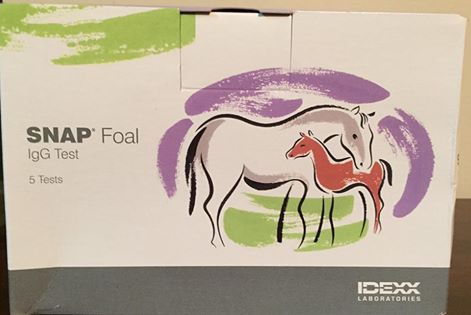Make Sure Your Foaling Checklist Includes IgG Test
 As 2016 comes to a close and the 2017 breeding season rapidly approaches, breeders prepare for to welcome their new arrivals. Whether you’re a small-time breeder or are in charge of a larger operation, you no doubt have a routine checklist you run through with the birth of each foal. Make sure that list includes an IgG test to be administered during the first 24 hours, regardless of whether you see the foal nurse or not.
As 2016 comes to a close and the 2017 breeding season rapidly approaches, breeders prepare for to welcome their new arrivals. Whether you’re a small-time breeder or are in charge of a larger operation, you no doubt have a routine checklist you run through with the birth of each foal. Make sure that list includes an IgG test to be administered during the first 24 hours, regardless of whether you see the foal nurse or not.
As veteran breeder, Debbi Trubee of North Farm, reminded us on Facebook, this is a simple and relatively inexpensive test that can save a lot of heartache down the road.
In a message on Facebook, she advised breeders, “Please be sure to have an IgG test done on your newborn foal within 24 hrs from birth. This inexpensive test will possibly save the life of your foal. Even if you see your baby nurse it does not guarantee they have received the proper amount of colostrum to survive. Failure of passive transfer foals fail very rapidly and will die if emergency treatment is not provided. This simple test can save you a lot of heartache! Foaling season is a joyous time for all of us and nothing makes me sadder than getting a phone call from a customer who has lost a baby because of this preventable issue. Wishing you all a safe and successful foaling season!”
So, what is an IgG test? Simply put, this blood test measures the amount of antibodies a foal has received from it’s mother in order to ward off everyday nasties that older horses develop immunity to. Foals are born with zero antibodies and receive their first immune system boost from their mother’s colostrum. IgG stands for Immunoglobin Type G, or the scientific name for antibodies.
However, receiving colostrum is not a guarantee that the little one has it’s jump start on immunity. Various factors can play a role in how much, if any, of the antibodies their system receives. Mares produce colostrum for only a few weeks to days before foaling, and can lose the vital nutrients and antibodies in the colostrum through dripping milk or they could have low levels of antibodies in their milk to start with. There are other causes that can attribute to the foal not gaining the antibodies it needs including inability to nurse and failure to absorb antibodies in the colostrum.
When an IgG test is administered within 24 hours of foaling, it allows the breeder to know if the foal absorbed the adequate amount of antibodies or if it needs supplementation in order to get it’s immune system up to par.


